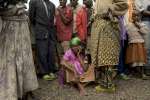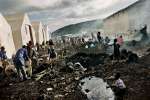- Text size
 |
|  |
|  |
| 
- Français
Repatriation of Congolese from Zambia reaches 40,000; camps to close
News Stories, 24 September 2010
KINSHASA, Democratic Republic of the Congo, September 24 (UNHCR) – The number of Congolese refugees repatriated from neighbouring Zambia by UNHCR since 2007 has topped the 40,000 mark.
The milestone was passed last Sunday when a UNHCR-chartered boat carrying 555 people arrived at Moba in the Democratic Republic of the Congo's Katanga province after crossing LakeTanganyika from the north Zambian port of Mpulungu. On Wednesday, a further 527 refugees arrived in Moba from Zambia.
The refugees had been living in the Mwange and Kala refugee camps after fleeing their homeland to escape conflict. They now feel the security situation has improved enough for them to go home.
UNHCR plans to close Mwange camp on Tuesday and Kala camp next month, before the voluntary repatriation programme is wrapped up at the end of this year. Some 7,200 refugees were repatriated in 2007, when the programme began, and about 6,200 so far this year. A peak in returns was reached in 2009, when UNHCR helped almost 17,000 go back to the DRC by boat or vehicle.
"The plan for 2010 is to repatriate 7,000. So we are way on target. The willingness of Congolese refugees at Kala and Mwange to repatriate is very high," Phillipe Creppy, head of UNHCR's sub-office in the Zambian town of Kawambwa, told journalists on Thursday. He said the milestone had been reached thanks to support from the two governments and donors.
Refugees who do not want to go home are being moved from Mwange to the Meheba Refugee Settlement in Zambia's North-Western Province.
Although other parts of the DRC remain volatile, especially the Kivu provinces to the north, Katanga has been relatively peaceful since the country's warring rivals signed a peace accord in 2003. Those arriving recently in Moba from Zambia have said they feel more confident about the situation in their vast province.
"Even if I do not have a job in DRC, I have to go back home with my family. I have to go back because I am Congolese," Kibingwa Malinga, a 45-year-old doctor, told UNHCR after stepping off the boat that recently brought him and his family to Moba. Doctors will certainly be needed in Katanga's recovery.
On arrival at Moba, the boats carrying refugees home from Zambia are always greeted by a loud and cheerful crowd of happy relatives, government officials and aid workers, including UNHCR staff.
Some 20,000 Congolese refugees are still being hosted in Zambia, but most have expressed the wish to go home. Many have learned skills in Zambia's camps, including agriculture, fishing or carpentry. These will help them build a new life back home.
Indeed, some of the returnees are thriving in Katanga. Kasenge wa Kasenge, for example, came back from Zambia at the end of 2009 and opened a transportation company in Moba. He now owns three trucks and runs a general store. When he fled to Zambia, he had only US$250 in his pocket.
In Katanga, UNHCR and its partners also provide skills training for the returnees and support income-generation projects and micro-credit schemes. Returnees receive food and shelter assistance to get started and are offered transportation back to their home areas.
By Celine Schmitt in Moba, Democratic Republic of the Congo and Kelvin Shimo in Kasama, Zambia














































